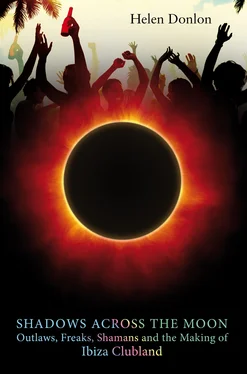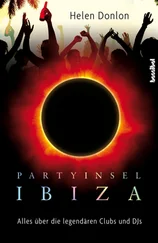I drove down the hill, with the smell of the morning mists on jasmine drifting in through the open windows, and the bright early morning sunshine dazzling me through the windscreen, vibrating enticingly from the glistening surface of the Mediterranean below. I’d heard the bass pulse sounds of a party rushing upwards towards Can Felix from the iconic nightclub Space at 2am before going to bed as I’d crept in past the pool the night before. Now d’en Bossa was quiet, but it still sizzled in the heat like the last cinders of a good time at the end of a bonfire. At the bottom of the hill down I hit the main road into Ibiza Town and headed for the port to get a coffee and an almond croissant, and to watch the early ferries depart for Formentera and Barcelona, something a lot of people still like to do in the mornings in town.
After breakfast I called Miquel at the Ajuntament and told him I’d be picking up James and taking him round the old town, to give him a taste of the Ibiza that Nico had known and loved. Miquel was already busy and just heading off to the cultural centre at Sa Molí, to finish up the arrangement in the display cases which were now bursting with Rafa Cervera’s Nico and Velvet Underground memorabilia, and he had to try to get the video displays he’d installed earlier to work. I promised to join him and help out once I’d despatched James back to the hotel for his pre-concert siesta. Picking up a couple of copies of that day’s Diario de Ibiza, the island’s daily paper, I stopped en route by the Multicine cinema complex, where on so many a Thursday over the years I’d gone with friends to see a film in their art house/foreign-with-subtitles programme, Anem al cine, and I parked the car in the giant car park so that I could take a minute to scan the Diario to see what kind of coverage we had for the event.
Our TV press conference of two days earlier had made it in there with a picture of us all. The press conference had been held at the Ajuntament building in Sant Antoni, and the multilingual group of us representing the event had stumbled along in Spanish (or in my case a kind of Catalan/Italian confection). To my relief, they’d quoted some of the things I’d said about Nico, so I got a chance to see what I actually had managed to get across, since I couldn’t really recall anything except how odd my version of Spanish was, even after all these years. Throwing the newspapers onto the passenger seat of the car, I made a quick stop at the nearby petrol station. I knew there was plenty more driving to do in the coming days and wanted to get that task out of the way.
James was awake and waiting for me in the hotel lobby, eager to explore a bit. So far his only impression of Nico’s island had been the road from the airport and the Sant Antoni hotel. We set off in the by now blazing static heat back towards Ibiza Town, specifically to the medieval walls of the old town, Dalt Vila, to walk where she had walked so many times over the years. Finding a parking spot right by the main wall at the back of Plaça del Parc, James thought I was joking when I said we were in luck having to only pay for a couple of hours parking as the meters would hit siesta time after that, but it’s true, the parking meters in Ibiza take siestas too.
Entering Dalt Vila we soon had to hide from the heat in one of dark and damp ancient tunnels, and in which we found some kind of medieval prison/torture chamber, but eventually we drifted down towards the port where back in the carefree days of her youth Nico had first found what she described as the freedom to be herself. Now that James was experiencing firsthand the island that had so mesmerised her, he claimed he could feel her presence along the old town walls and told me that he finally recognised how the kaleidoscope of atmospheres and architecture, colours and character combined would have made her so happy there.
We walked on through the old market place and bought a small bag of fresh and locally grown figs which we took with us to the port to have with a cold drink. In front of us two enormous boats were moored. They belonged to the now annual caravan of Mediterranean and Arab playboys who frequented the island at the height of club season, and whose owners would float like social butterflies from one VIP table to the next in the clubs and more expensive beach restaurants. They brought in a lot of money for the clubs and restaurants, but their presence was typically greeted with bemused indifference by locals.
As we headed along the port we passed the site of the former Domino bar, and the pre-clubbing bar the Rock, which had once been Clive Crocker’s “Clive’s” bar too (it still says “Clive’s” on the door even today) and I asked James if Nico had ever mentioned Clive to him. He had no memory of that, but he was beginning to understand that there was so much of her he never knew about. Her Mediterranean alter-ego had been there underneath the grime of touring all along.
The last time James ever saw Nico was on the night of the final gig they played together, at the Berlin Planetarium in 1988 (the one that became Fata Morgana). Although her heroin habit was by then dealt with, she was still struggling with daily existence in other ways and had even told a few friends that she was thinking of coming to Ibiza to die. “I think Ibiza meant for Nico a refuge, a place of re-evaluation where she could live a less chaotic existence for a while,” James had told me. “But it might also be that she was re-imagining and wishing to re-enter the ethos of an era that was now gone. For European intelligentsia as well as ‘bohemia’ the Mediterranean, during the immediate post War period, represented something life-affirming after all that horror and destruction: the sun, the sea, fertility, Picasso, Matisse, Robert Graves, Lawrence Durrell, Bardot, Loren etc.”
But, of course, this was now thirty years later, 1988, and the beginning of Ibiza as European party capital. “Nico was definitely not a party animal, “ he continued. “I don’t think she would have liked the Ibiza of today, the industrial sized clubs, the package holidays, the Ecstasy, the sexual exhibitionism, the hedonism. Nico was a bohemian, yes; a junkie, sure … but also a puritan.”
It was an interesting perspective on a woman whose peripatetic existence had meant that she was parted from her one child, her son Ari, for very long periods of time, and frequently, as she moved from one New York abode to another, or California, or Paris where she lived in near obscurity for years with her lover the filmmaker Philippe Garrel. Ari had grown up partly on the island too, staying for long periods with his grandmother in her house there. “Last year I was talking to Ari,” Young continued, “and he thinks she knew she was dying. So now, ultimately, I guess there was another agenda. She went to Ibiza to die. She didn’t want to die in Manchester, or Berlin or Paris or New York. She wanted to die in a cradle of life. As a girl she saw Berlin on fire, watched the death trains to the camps roll by, lived her dream life literally in a graveyard. The Mediterranean would bathe her body clean, bleach her bones, return her to the source. I am touched by this idea of an Ibiza tribute to Nico. I think, for Nico, Ibiza represented freedom: freedom from the world and, ultimately, freedom from herself. It was a place she chose to live, to re-invent herself … and to die, a free woman.”
We stopped for a quick sandwich near the Hotel Montesol, the old yellow and white 1933 building on Vara de Rey – the charming avenue which runs from the top of the port into the main drag of Ibiza Town. The Montesol had been a meeting place for travellers since Walter Benjamin and his ilk first came through in the 1930s, and by the 1960s it was beatnik central. These days it was still a favourite meeting place for locals, and served, alongside its regular lunch and dinner menus, the most incredible hot chocolate and churros on winter nights.
Читать дальше











